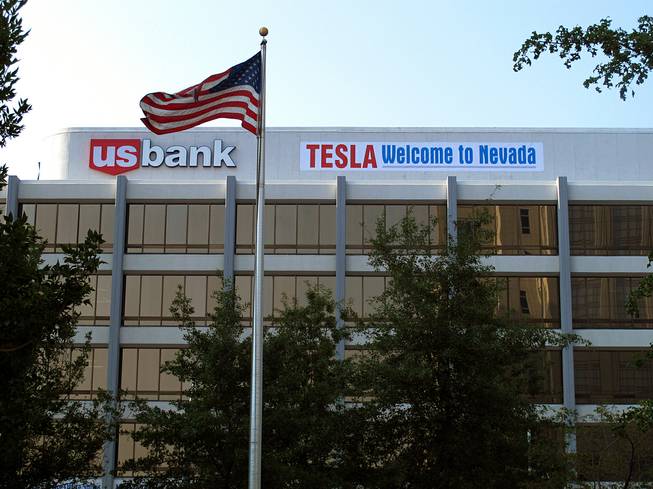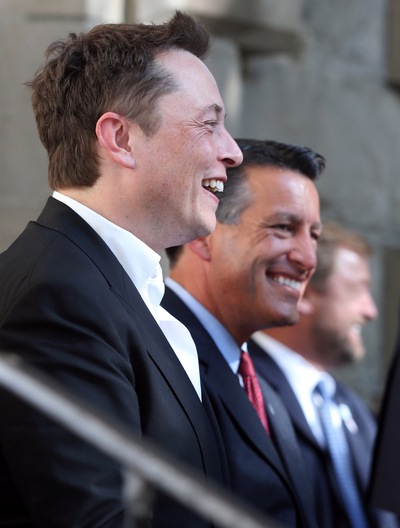
Scott Sonner / AP
A banner welcoming Tesla to Nevada is hung on the US Bank building south of the downtown Reno casino district Tuesday, Sept. 9, 2014. State lawmakers planned to meet in a special legislative session in Carson City on Wednesday to consider a package of tax breaks and incentives worth as much as $1.3 billion to seal a deal to bring the electric car maker’s $5 billion lithium battery “gigafactory” to an industrial park in the state.
Wednesday, Sept. 10, 2014 | 2 a.m.
On the eve of today’s special legislative session, the public and many lawmakers were still in the dark about legislation relating to the tax incentives Gov. Brian Sandoval offered to Tesla Motors to build a $5 billion lithium ion battery factory.
By Tuesday night, a majority of lawmakers had yet to see drafts of legislation that will outline the $1.3 billion worth of tax breaks and other promises given to Tesla by the Sandoval administration. The governor’s office added uncertainty because it didn't release until 11:21 p.m. Tuesday the special-session proclamation, a mandate that outlines when lawmakers should convene and what lawmakers need to discuss.
The secrecy and behind-closed doors practices have been a staple of the Tesla deal. The Legislature’s website had few details about the session. One sign of the special session was the list of registered lobbyists.
But lawmakers weren’t fretting about the details when they arrived in Carson City Tuesday.
The deal’s inner workings are understood: Give Tesla what it needs or don’t get Tesla at all.
Last week, the governor’s office issued a two-page explainer of the details: Tesla won’t pay sales or property tax until 2034. The company won’t pay property tax until 2024. The state will give Tesla tax credits for investing up to $3.5 billion and offering high-wage jobs.
It’s unknown when the bills were actually released to lawmakers. But both parties planned for late-night study sessions. Tuesday night, legislative leaders confirmed there would be five pieces of legislation they will tackle today.
Assembly Minority Leader Pat Hickey, scheduled members of his caucus to meet with Sandoval’s chief of staff, Mike Wilden, and Steve Hill, the director of the Governor’s Office of Economic Development.
Hickey, a Reno lawmaker, arrived in Carson City on Sunday to get a jumpstart. In his office he had stacks of economic development reports he was ready to issue to his members as homework.
“We’re pulling an all-nighter if necessary,” he said. “We will read, dissect and discuss before we vote.”
Lawmakers’ understanding of the proposed laws will determine whether they vote on the legislation late this evening or work into Thursday. The session is expected to end before Friday.
Headed north
For many Southern Nevada lawmakers, Tuesday began at McCarran International Airport.
The top Democratic legislative leaders were en route to Carson City on the 11:10 a.m. flight to Reno. Both Assembly Speaker Marilyn Kirkpatrick and Senate Majority Floor Leader Mo Denis were crammed onto a jammed-pack jet.
When lawmakers arrived in the north, groups of them traveled to the site where Tesla will build its facility.
Others were trying to catch their breath.
Democratic Sen. Debbie Smith said she had to cut a business trip short due to the special session. She represents Sparks and was in a Carson City cafe Tuesday afternoon grabbing a coffee. She spent 20 hours traveling to make it to the capital.
When asked if she was going to be working late Tuesday, her reply was brief: “It looks like it.”
Lobbyists
By Tuesday evening the list of lobbyists had grown from a handful to a litany of more than 30.
But one name that wasn’t on the list was Tesla.
The car-maker’s CEO and wunderkind, Elon Musk, isn’t expected to be back. But it’s likely that company officials will make their way through the halls of the Legislature.
“They will be around,” Hickey said.
Many of the lobbyists on the list are expected to quell any concerns held by lawmakers and assure them that Nevada will be able to work the deal offered by the governor.
Some Southern Nevada lawmakers have said their constituents have expressed concerns that only Northern Nevada will get the jobs.
But that’s not the case, said Paul Enos, Nevada Trucking Association lobbyist.
A Las Vegas company represented by his association has already been paid to haul material from the south to the north, Enos said.
“We expect more and hope for more,” he said.
The critics
Criticism from the Tesla deal has been loudest from the Nevada Policy Research Institute, a Las Vegas-based libertarian think tank.
It’s taken aim at the speed and the size of the deal’s projections for Nevada.
The governor’s office estimated Tesla will bring the state 22,000 jobs.
Around 6,500 jobs will be at Tesla’s factory, according to the state. The remainder will spur from growth propelled by the electric car maker’s push to be the nation’s most affordable and desirable vehicle not dependent on fossil fuels.
Tuesday, the institute sent out a press release citing research from New York University Global Research Professor Richard Florida that said Nevada officials are overestimating the rate of job growth. The NYU professor projected Tesla could create 4,500 jobs, claiming the state’s multiplier for estimating job growth was too generous .
The NPRI and NYU release conflicted with information from UNLV economics professor Alan Schlottmann.
He estimated that job gains wouldn’t be immediate because the battery factory is a new industry to Nevada. But he suggested that projected demand from the state and Tesla would be achieved “over time.”
The state’s demographer, Jeff Hardcastle, projects $100 billion in growth over 20 years.
He used a common-practice program that the state has used in the past to measure the estimates. In a letter to the Governor’s Office of Economic Development, he called his $100 billion >calculation, “conservative.”
The story has been revised. An earlier version incorrectly said employees would not pay property taxes. Under the proposal, Nevada would waive property taxes for the company, not its employees.


Join the Discussion:
Check this out for a full explanation of our conversion to the LiveFyre commenting system and instructions on how to sign up for an account.
Full comments policy